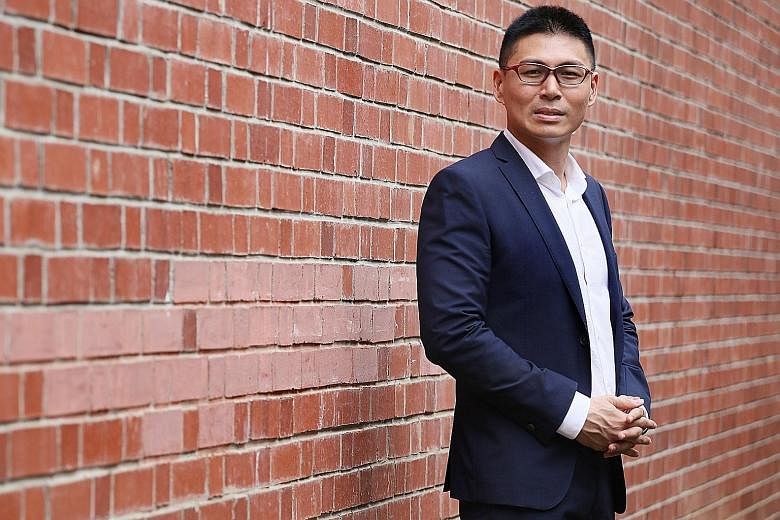When it was time to start investing his savings after landing his first job, teacher and entrepreneur Edwin Edangelus Cheng sat down with a pen and paper and made detailed calculations about how and where to put his hard-earned cash to work.
Mr Cheng had always been aware of the importance of trying to get a return on his capital and had made use of investment seminars and workshops and other sources.
These included books on investing like: Rich Dad, Poor Dad by Robert Kiyosaki and The Richest Man In Babylon by George Samuel Clason.
Mr Cheng, 36, began as a value investor - dabbling in undervalued stocks after studying company financial reports. But slow returns pushed him to try technical analysis instead, so he switched to studying charts and candlestick patterns to pick and choose his stocks.
"I lost money on both sides," says Mr Cheng, the co-founder of EduEdge, a tuition school specialising in teaching English, General Paper and literature.
Badly burned, Mr Cheng took a hiatus from investing to concentrate on building his career in the teaching profession.
What started as a small tutoring class of just six students in his parents' Housing Board flat soon grew by word of mouth into a 1,200 sq ft centre in Serangoon that he co-founded with a friend. It now supports nearly 1,000 students.
Mr Cheng had managed to blend his passion for mathematics with his love for teaching to come up with a unique method of teaching English - through formulas. And it worked.
-
Worst and best bets
Q What has been your biggest investing mistake?
A Back in early 2009, I shorted the Dow Jones Industrial Index after the Lehman crisis in 2008.
What I didn't know was that the market was already at the tipping point to make a reversal and go uptrend.
When the market went against my trade, I still stubbornly stuck onto my trade instead of cutting my losses.
At one point in time, I had unrealised paper losses of approximately US$50,000 (S$67,300), which would have wiped out my entire savings.
Thankfully, due to a series of interventions, I managed to cut the paper losses to US$19,000 - but it was a very painful experience.
Lesson learnt: We must have an entry and exit strategy and know when to cut losses based on our risk appetite. We shouldn't bite on more than we can chew.
Q What has been your best investment?
A My education business - EduEdge.
I started the business solo from my bedroom in 2013, serving a group of six students.
By the end of the year, I had to lease a commercial premise because I was receiving a lot of requests for English tuition through referrals from my former students and my parents.
Together with my business partner, we invested $30,000 in renting and designing a 330 sq ft commercial space.
Thanks to the numerous word-of-mouth referrals from my parents and students who benefited from my method of teaching English, the business recouped costs in three months and became a seven-figure business in less than 20 months.
We currently occupy a 1,200 sq ft premise and the entire team comprises 12 staff.
Once his teaching business took off, Mr Cheng decided to re-enter the markets. But this time around, he came in with the realisation that he had neither the time nor the temperament for stock market investments as before.
So he chose a middle ground and sought help from financial advisers to build a portfolio, one that is now diversified across different asset classes and is six-figure strong.
Q Moneywise - how were your growing-up years?
A I am an only child. My dad was a blue-collar worker, my mum was a full-time housewife. Our working-class background helped me learn the value of thrift from my parents at a young age. They also taught me how to differentiate between a "need" and a "want".
However, even though money was hard-earned, they made sure I never lacked anything. They invested in my education, including tuition in English (I was weak in the subject back then), hanyu pinyin classes, art classes, etc. They were willing to break the bank just to ensure that I received the best academic support, in the hope that I would excel academically and do well in life.
Q How did you get interested in investing?
A I have seen how hard my parents had to work to provide for the family. I also worked long hours in my first job, which made me realise it was important to work because I wanted to and not because I needed to. It was also important to make one's money work for you and not the other way around.
I started dabbling in stocks and shares back then. I armed myself with financial knowledge with the intention of achieving financial independence. I read books on investing and attended workshops and courses to equip myself with the fundamentals of stock trading.
Q What's in your portfolio?
A It comprises 50 per cent fixed-income securities in the form of endowment policies and an annuity plan which generates a projected annualised average return of about 4.2 per cent to 4.5 per cent. I purchased these plans to supplement my CPF Life payouts to meet my retirement needs.
Thirty per cent of my portfolio is invested in several foreign exchange accounts managed by professional traders. It has given me about 50 per cent returns to date for the last two years.
The rest of my funds are in a current account (effective interest rate 2.43 per cent per annum) and money market funds (0.79 per cent per annum) as opposed to fixed deposits, as I like to have liquidity on hand while waiting for the right investment opportunity.
Currently I am researching the market of cryptocurrencies (such as bitcoin, ethereum and ripple) and waiting for the right opportunity to invest in them.
Q Describe your investing strategy.
A I would say that I used to be much more aggressive in my investing style during my earlier days but having been burned badly, I now adopt a much more conservative to moderate risk approach. I save approximately 60 per cent of my monthly income and park it aside for the right opportunities to invest.
I do a rebalancing of my portfolio once every quarter to ensure that it is still in alignment with my investment objectives and goals.
Throughout this journey, I've realised that patience and strategy are a must when it comes to investments. It is dangerous and foolhardy for any individual to think that they can make a quick windfall from the stock or forex market.
A more prudent approach for the majority of people will be to save on a regular basis and channel their savings towards different asset classes (like property, stock, forex or bonds) according to their risk appetite. Medical and health insurance is also necessary as healthcare costs will rise sharply in the coming years.
Q What does money mean to you?
A Money is a vital ingredient in life, especially in modern society. It takes care of our basic needs like food, clothing and shelter, as well as our aspirational needs like entertainment gadgets, cars and vacations. But, as empowering as money is, it is also important to make sure that it does not overpower us; we do not become slaves to it.
Q What's the most extravagant thing you have done?
A Honestly speaking, I've never really bought anything truly extravagant for myself. The computer, gym membership and occasional travel are some of the big-ticket purchases to date.
For me, money is well-spent if it buys me more time, or it brings happiness to my loved ones or it helps me forge wonderful memories, experiences. I look forward to taking my family and friends for an overseas holiday.
Q What are your immediate investment plans?
A I'm actively looking to acquire more assets which will generate consistent passive income streams. Property and cryptocurrencies are two key assets which I would like to explore if the conditions are right.
Q How are you planning for retirement?
A Based on a conservative estimate, I will need approximately $5,000 (in real-dollar terms after taking into account inflation) for my monthly expenditure 20 years down the road, and this will comprise a variety of passive income-generating assets - like CPF Life, property, managed assets, etc.
Q Home is now...
A A four-room HDB apartment in Serangoon where I live with my parents. I'm on the lookout to purchase my first property soon, probably an HDB resale flat or a condominium.
Q I drive...
A I don't drive as I see a car as a depreciating asset. What's more, it is relatively much cheaper to get to anywhere in Singapore with our efficient public transport system. And now with Uber and Grab, it has become even more convenient to travel around Singapore.


